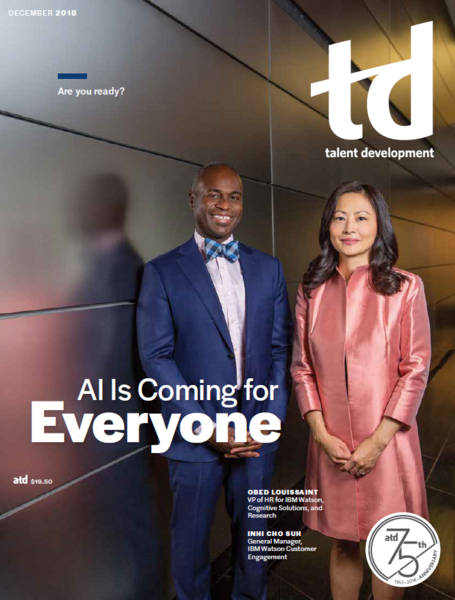TD Magazine Article
Member Benefit
Employees’ Digital Skills Deficits Are Problematic
Content
As companies look to digitize operations, talent management leaders face a significant skills gap.
As companies look to digitize operations, talent management leaders face a significant skills gap.
Mon Dec 03 2018

Content
As jobs continue to evolve, workers are struggling to keep up.
As jobs continue to evolve, workers are struggling to keep up.
Content
Businesses in every industry are undergoing a digital transformation. "More than two-thirds of business leaders believe that if their company does not become significantly digitalized by 2020, it will no longer be competitive," says Brian Kropp, group vice president of Gartner's HR practice.
Businesses in every industry are undergoing a digital transformation. "More than two-thirds of business leaders believe that if their company does not become significantly digitalized by 2020, it will no longer be competitive," says Brian Kropp, group vice president of Gartner's HR practice.
Content
To navigate this new digital environment, companies need employees skilled in data analytics, mobile management, machine learning, social media, security and privacy, and smart technologies. Yet, as companies look to digitize operations, talent management leaders face a significant skills gap. According to Gartner data, 70 percent of employees have not mastered the skills they need for their jobs today, and four in five employees do not have the skills needed for future roles.
To navigate this new digital environment, companies need employees skilled in data analytics, mobile management, machine learning, social media, security and privacy, and smart technologies. Yet, as companies look to digitize operations, talent management leaders face a significant skills gap. According to Gartner data, 70 percent of employees have not mastered the skills they need for their jobs today, and four in five employees do not have the skills needed for future roles.
Content
The leadership ranks are feeling lapses in digital skills the hardest,according to Workplace 2025: The Post-Digital Frontier, a Randstad USA study. Although 95 percent of the 3,000 companies surveyed said they believe organizations need a new kind of leader to address the digitization changes and challenges, a majority (63 percent) don't have a strong digital leader in place.
The leadership ranks are feeling lapses in digital skills the hardest,according to Workplace 2025: The Post-Digital Frontier, a Randstad USA study. Although 95 percent of the 3,000 companies surveyed said they believe organizations need a new kind of leader to address the digitization changes and challenges, a majority (63 percent) don't have a strong digital leader in place.
Content
"If organizations don't have leaders in place with the digital prowess required to navigate this new reality, they'll struggle," says Jim Link, chief human resources officer for Randstad North America.
"If organizations don't have leaders in place with the digital prowess required to navigate this new reality, they'll struggle," says Jim Link, chief human resources officer for Randstad North America.
Content
Tech skills aren't the only deficits. Randstad identifies several leadership capabilities executives will need in the postdigital era: Leaders must have the ability to keep people connected and engaged, be more agile and digitally savvy, drive a culture of innovation and learning, and be adept at risk-taking.
Tech skills aren't the only deficits. Randstad identifies several leadership capabilities executives will need in the postdigital era: Leaders must have the ability to keep people connected and engaged, be more agile and digitally savvy, drive a culture of innovation and learning, and be adept at risk-taking.
Content
The risks for organizations lacking digital leadership can be significant, the study notes. Not only is there a lower likelihood that digital initiatives will meet their full potential, but companies will experience challenges in attracting and retaining top talent who are interested in working on digital initiatives.
The risks for organizations lacking digital leadership can be significant, the study notes. Not only is there a lower likelihood that digital initiatives will meet their full potential, but companies will experience challenges in attracting and retaining top talent who are interested in working on digital initiatives.
Content
"The best investment that companies can make in their future is to identify and cultivate individuals with strong digital skills and sharp instincts for what's coming next, as they'll drive innovation and keep their companies competitive," says Link.
"The best investment that companies can make in their future is to identify and cultivate individuals with strong digital skills and sharp instincts for what's coming next, as they'll drive innovation and keep their companies competitive," says Link.

